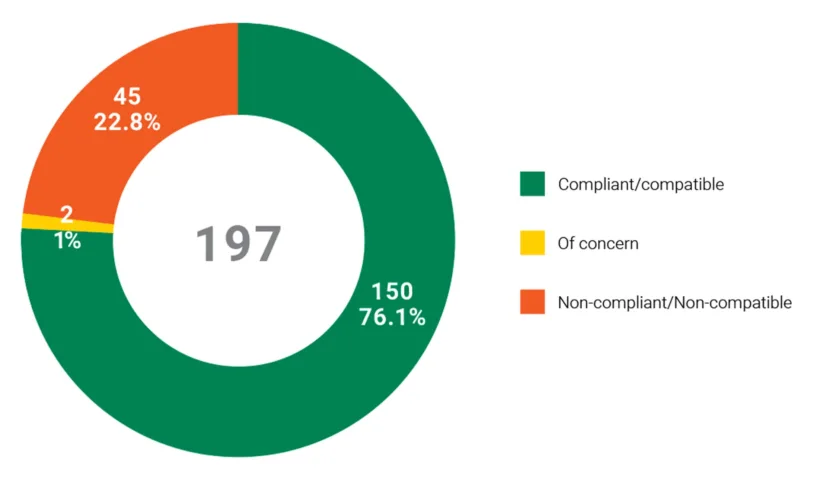Compliance and compatibility with the prohibitions of the TPNW
One hundred and fifty states—76% of the total in the world—already abide by all of the prohibitive norms that the Treaty on the Prohibition of Nuclear Weapons (TPNW) has established. But a sizeable minority of 45 states (almost 23%), engaged in a range of activities in 2024 that in different ways conflicted with the TPNW, while the conduct of two states was of concern. Of the 45 states, 32—more than 70%—are European. To avoid remaining between the international community and the fulfilment of the United Nations’ long-standing goal of the elimination of nuclear weapons, they would all have to make varying degrees of changes to their existing policies and practices.

Article 1(1) Prohibitions
Each State Party undertakes never under any circumstances to:
(a) Develop, test, produce, manufacture, otherwise acquire, possess or stockpile nuclear weapons or other nuclear explosive devices;
(b) Transfer to any recipient whatsoever nuclear weapons or other nuclear explosive devices or control over such weapons or explosive devices directly or indirectly;
(c) Receive the transfer of or control over nuclear weapons or other nuclear explosive devices directly or indirectly;
(d) Use or threaten to use nuclear weapons or other nuclear explosive devices;
(e) Assist, encourage or induce, in any way, anyone to engage in any activity prohibited to a State Party under this Treaty;
(f) Seek or receive any assistance, in any way, from anyone to engage in any activity prohibited to a State Party under this Treaty;
(g) Allow any stationing, installation or deployment of any nuclear weapons or other nuclear explosive devices in its territory or at any place under its jurisdiction or control.
The prohibitions of the TPNW are contained in Article 1 of the Treaty. The Nuclear Weapons Ban Monitor sets out interpretations of each of the prohibitions and assesses whether each of the 197 states that can adhere to the TPNW—regardless of whether it has consented to be bound by the Treaty—acts in accordance with its prohibitions. On the basis of their policies and practices, states parties and signatories are categorised as either ‘compliant’ or ‘noncompliant’, whereas non-parties are categorised as either ‘compatible’ or ‘non-compatible’. Where a state has been assessed to be ‘of concern’, this means that worrying developments in the state warrant close attention as a possible breach of the standards is on the horizon.
The Nuclear Weapons Ban Monitor finds that 97 of the 98 states that as of 31 December 2024 were parties or signatories to the TPNW were compliant with all of the Treaty’s ten principal prohibitions in 2024. One state party—Kazakhstan—was found compliant with nine prohibitions but non-compliant with the tenth: the prohibition on assisting a prohibited activity.
The conduct of 53 of the 99 non-parties was also fully compatible with all of the Treaty prohibitions, while 44 non-parties—the same number as in 2023—engaged in conduct that was not compatible with one or more of the prohibitions. Non-parties Iran and Saudi Arabia, which have different degrees of latent nuclear weapons development capabilities, were again recorded as states of concern.
Every state may lawfully sign and ratify the TPNW, but those 53 states not yet party whose conduct is fully compatible with all of the prohibitions can adhere to the Treaty in the knowledge that they already meet its obligations without the need to change existing policies and practices.

The TPNW and 'nuclear deterrence'
The TPNW does not explicitly prohibit or even mention ‘nuclear deterrence’. The reason for this is that deterrence is not a specific act or behaviour, but a psychological state that may or may not exist inside an adversary’s head. However, the TPNW prohibits a range of specific actions that are typically performed with the aim of fostering deterrence, including possessing nuclear weapons, hosting nuclear weapons, threatening to use nuclear weapons, or assisting or encouraging other states to engage in such behaviour. Crucially, these behaviours are prohibited irrespective of whether they succeed in fostering ‘deterrence’ in the minds of potential adversaries.